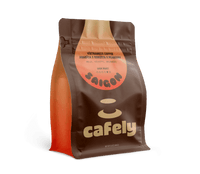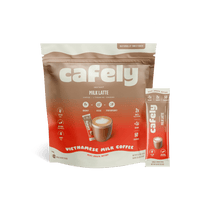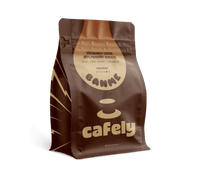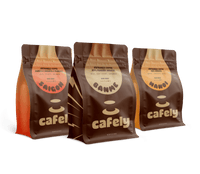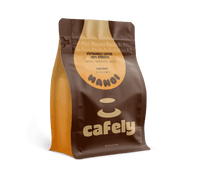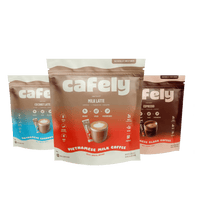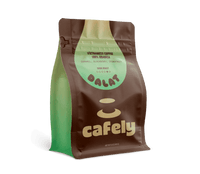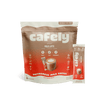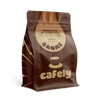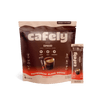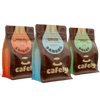Even though caffeine is supposed to make you more alert and awake, sometimes we can find ourselves feeling the opposite effect. So, why does coffee make you tired? There are plenty of scientific reasons why this happens, sometimes from having too much coffee and sometimes from having too little.
Don’t worry; we explain some of the most common reasons so you can figure out how to stay alert and active, all while enjoying your favorite cup of coffee.
Let’s dive straight in.
1. The Caffeine Might Be Wearing Off

One of the biggest reasons why coffee might be making you sleepy is simply that the caffeine is wearing off. We get a huge spike of energy when the caffeine hits our system, so when it wears off, we often feel a big caffeine crash. You can delay that crash though and keep your energy up longer by choosing the best coffee to stay awake, typically robusta-based blendss with a stronger caffeine kick.
On average, caffeine stays in your system for around 10 hours, with the peak happening around 45-60 minutes after consumption. The half-life of coffee is normally between 3-5 hours, so this is when you’ll likely feel a lot of the caffeine wearing off.
In fact, sometimes, this can make us feel even more tired than we did before we had the coffee. That’s because we’re going from high caffeine levels to basically non-existent levels, which is a big swing for our bodies to handle.
Pro tip: You can get a handle on this crash by drinking plenty of water and staying hydrated, which can counteract some of the symptoms of a caffeine crash, like headache and exhaustion..
2. You’re Feeling a Sugar Crash

If you enjoy a bit of sugar with your coffee, then in addition to a big caffeine drop, you’ll also experience a sugar crash.
Sugar levels can be really sensitive, and it's a balancing act to keep insulin levels in check. Your body will increase insulin after you eat a lot of sugar, which causes blood glucose to drop, resulting in a sugar crash. This is why an hour or so after we eat sugar, the big energy and glucose spike disappears, and we find ourselves in a lull.
It can feel even worse when the double hit of caffeine and sugar wears off at once. No wonder we feel so drained after a super-sweet coffee! (If you’d like to switch to a sugar-free coffee drink, try our packs of Vietnamese coconut coffee.)
Besides being tired, a sugar crash can also cause you to feel the following:
- Hungry
- Irritable
- Distracted
- Jittery
- Anxious
Pro tip: To avoid a sugar crash, eat a well-balanced meal with high-sugar or simple sugar foods (foods that have minimal nutritional value and are made with processed sugar). If it’s too late and you’re heading into a sugar crash, eat a high-protein snack. Protein helps balance out glucose levels.
3. Maybe You’re Dehydrated

Coffee lovers everywhere can relax — contrary to popular belief, coffee doesn’t cause dehydration [1] even though caffeine is a diuretic. However, it can make you go to the bathroom more, causing you to lose fluid faster than normal. If you find drinking coffee has this effect, you may need to drink more water to counterbalance the loss.
It’s common for the average person to be mildly dehydrated often enough (feeling thirsty is one of the first signs). There are other things that can contribute to dehydration, such as climate, physical activity, and diet, and consuming water often isn’t a priority with all of life’s other pressing issues.
Hydration has a huge impact on our body. When we’re dehydrated we feel sluggish, slow, and sleepy and things don’t work as they should.
Other common signs of mild dehydration include:
- Headache
- Fatigue
- Sugar cravings
- Dry mouth
- Dark-colored urine
Stay on top of it by drinking water throughout the day — don’t wait until you’re thirsty. On average, your body needs 6-8 cups of water per day.
Pro tip: Tired of water? We get it. Fortunately, there are other ways to quickly rehydrate. Fruit is 80-99% water, making it a great hydrating snack. Research suggests milk could be the ideal rehydration drink — it’s nutrient-dense and is just as or more effective than commercial electrolyte drinks [2].
Now, you can easily justify that next cup of coffee.
4. Your Adenosine Receptors Are Blocked

How this works is a little sneaky. Caffeine gives us that boost of energy by blocking something called the adenosine receptors, which help regulate our sleep patterns.
Adenosine slows down our brain’s processes and allows more oxygen into our system to help us sleep, but caffeine largely does the opposite.
The problem is, caffeine and adenosine look really similar to our brain. When caffeine binds to adenosine receptors, the adenosine has nowhere to go because caffeine is, essentially, taking its spot.
Our bodies don’t stop making adenosine, however, and we’re left with an overabundance of it once the caffeine is gone. With caffeine having a half-life of 3-6 hours [3], quite a bit of the adenosine can build up.
Pro tip: Chronic coffee use means these adenosine levels never quite return to baseline — and is partly why you can build a tolerance to caffeine. In order to “fix” this, you need to cut back on caffeine or stop using it altogether.
5. You’re Going Through Caffeine Withdrawal

On average, caffeine withdrawal kicks in between 12-24 hours after your last bit of coffee, peaks between 20-51 hours, and can last anywhere from two to nine days in total [4]. If you’re trying to limit your caffeine intake and wean yourself off coffee, you’re probably going to feel pretty tired.
While it’s easy to just say that it’s because you don’t have as much caffeine in your system, that’s not actually the full story.
Realistically, you can start to become dependent on caffeine if you have 2-4 cups per day or 350 mg of caffeine per day. The stronger your dependency, the longer and harsher the symptoms of withdrawal are likely to be.
Coffee is a stimulant so your body gets used to operating with it. When you try and limit your caffeine intake, your body goes through a period of adjustment. The caffeine impacts blood flow, adenosine receptors (as mentioned above), among other things, and so you often feel tired and irritable. Caffeine and its impact on the brain's blood vessels also explain why coffee causes headache when you try to limit your intake.
Pro tip: You can combat tiredness by focusing on increasing your water intake, exercising more, and trying to get yourself into a regular sleep schedule. Or have a cup or two of coffee.
6. You Drank Too Much Coffee (Caffeine-Induced Stress)

Finally, you might feel like coffee makes you sleepy if you have caffeine-induced stress. Basically, this is when you go beyond the recommended maximum amount of coffee, and you feel jittery. These annoying coffee jitters, increased heart rate, headaches, and excess energy can tire out your body really easily.
The recommended maximum amount of coffee you should have per day is 400 mg of caffeine or four regular cups. However, some coffee, like our HaNoi beans (100% robusta), has twice as much caffeine as traditional Arabica beans. High street coffee chains can have up to 325 mg per cup due to the large size — so it’s easy to get over the recommended amount if you’re not careful.
Our bodies can only take so much stress and strain before needing to recuperate through sleep, which is why after we’ve felt jittery, we want to have a nap. The peak from caffeine hits between 45-60 minutes after consumption, and you’ll likely begin to experience a caffeine crash after this.
While an occasional coffee jitter isn’t super dangerous on its own, if you continue to overconsume caffeine, you are putting your body under unnecessary physiological stress. This can lead to caffeine overdose — which can include irregular heart rates, seizures, hormonal imbalances, and more.
Pro tip: Keep an eye on your coffee consumption and reduce how much you use if this is an ongoing issue. Otherwise, rest and drink plenty of water to overcome the tiredness.
FAQs: Coffee & Sleep

Okay, so now we’ve gotten to the bottom of why coffee makes you sleepy, let’s dive into some frequently asked questions about coffee and sleep.
1. Can I drink coffee after 8 p.m.?
It’s recommended that you have your last cup of coffee or caffeinated drink at least six to eight hours before bed. So, if you’re going to bed at 3 a.m., it’s fine to have coffee after 8 p.m. However, for most people working 9-5 jobs, that means cutting back on coffee in the early afternoon.
2. Should I drink coffee first thing in the morning?
No, you should probably wait about an hour before having coffee when you wake up. This is so that you don’t cause a spike in your cortisol levels and increase stress in your body. It can also increase glucose and insulin concentrations [5].
That said, reaching for coffee right after waking — especially after a hangover — is something many of us do without a second thought. Consider choosing the best coffee for hangover relief, like a smooth brew infused with electrolytes or adaptogens to ease you into the day.
3. Is coffee bad for my sleep?
Yes. If you’ve ever had trouble sleeping after coffee, caffeine is likely the culprit. Coffee can be bad for your sleep if you have caffeine in your system at bedtime. This might cause issues getting to sleep or impact the quality of your sleep throughout the night. It’s suggested that we don’t get as high-quality sleep if there is caffeine still in our system because our body struggles to fall into a deeper sleep.
4. How can I stay awake without caffeine?
There are plenty of ways to stay awake without caffeine, including drinking more water, avoiding screens, ensuring you have a balanced diet, and getting into a routine to help regulate your sleep schedule. All of these things have a huge impact on our tiredness.
5. Should I drink decaf before bed?
If you really need your coffee fix before you go to bed, then we’d recommend having decaf over fully caffeinated coffee. You’ll still get the delicious taste, just without the buzz that’ll keep you tossing and turning all night long!
References
- Killer, S. C., Blannin, A., & Jeukendrup, A. E. (2014). No evidence of dehydration with moderate daily coffee intake.
- Roy, B. D. (2008). Milk: the new sports drink? A Review. Journal of the international society of sports nutrition, 5(1), 15.
- Evans, J., Richards, J. R., & Battisti, A. S. Continuing Academic Recent.
- Sajadi-Ernazarova KR, Anderson J, Dhakal A, et al. [Updated 2023 Aug 8]. Caffeine Withdrawal. In: StatPearls [Internet]. Treasure Island (FL): StatPearls Publishing; 2024 Jan-.
- Smith, H. A., Hengist, A., Thomas, J., Walhin, J. P., Heath, P., Perkin, O., ... & Betts, J. A. (2020). Glucose control upon waking is unaffected by hourly sleep fragmentation during the night but is impaired by morning caffeinated coffee. British Journal of Nutrition, 124(10), 1114-1120.
